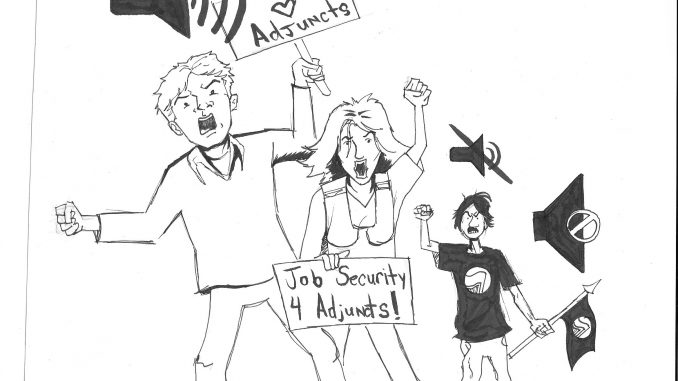
In response to the perceived mistreatment of adjunct professors by the campus administration, the New Paltz chapter of the United University Professions (UUP) held a protest in front of the Humanities building on Monday, May 1. What began as a small crowd eventually exploded into triple-digit figures, with students and faculty from various social justice organizations flocking en masse to express their disapproval of the recently announced adjunct policy. Additionally, some groups sought to use the event to express their frustration with the Trump administration.
One such group whose presence was noted at the protest was the “Antifa,” or Anti-Fascist Action.
Antifa recently made headlines for the movement’s involvement in the divisive protests that consumed the campus of University of California, Berkeley. These protests followed Berkeley’s invitation to right-wing commentator Milo Yiannopoulos for a guest speaking role. Within hours, the campus which championed the free speech movement during the 1960s, became ensnared with destructive riots and numerous firebombings after anti-fascist advocates clothed in black showed up. Ultimately, the campus suffered around $100,000 in property damage as a result of the unhinged violence and has inherited a reputation for thought intolerance.
Given this important context, we at The New Paltz Oracle must express how dismayed and disappointed we are by the presence of Antifa on our own campus. As advocates of free speech and intellectual diversity, we condemn the use of violence in the name of any cause, even anti-fascism. We absolutely do not approve of fascism, but Antifa’s methods, which rely heavily on intimidation and shutting down those whom they disagree with, have the potential to make the SUNY New Paltz campus an unsafe place. There are already enough issues with creating a campus culture that will acknowledge and engage with differing perspectives. Allowing a far-left wing paramilitary group to patrol campus does not help achieve that cause.
Since Antifa is a loosely affiliated movement, we understand that the aggressive actions of protesters in California do not necessarily reflect the intentions of the Antifa protesters here.
The actions of one chapter do not reflect on the actions or ideals of a widespread group and we do not believe in generalizing organizations. However, we implore those associated with the May 1 protest to take into consideration the implications of the name they choose to associate with.
This is especially true of their flag, which was large and proudly displayed on the academic concourse, very closely resembling that of Antifaschistische Aktion, a far-left paramilitary group originally created to combat fascism in Germany in the 1930s, when the group was established as a replacement to Roter Frontkämpferbund, the paramilitary branch of the German Communist Party.
Living in the era of increased conflict on college campuses due to political partisanship and the debate over intellectual diversity, we assert that everyone should feel welcome to speak openly. No one should be silenced from expressing their views, not even Antifa, but it is a result of their aggressive behavior on other campuses that we must sound the alarm when they show up at SUNY New Paltz.
Even if these anti-fascist protesters mean no harm—and, to be clear, they’ve done nothing to explicitly indicate that they do—their affiliation with radical paramilitary groups is cause enough for concern for the broader campus community. The protesters on May 1 made no attempt to cover their faces like the anti-fascist activists at Berkeley, so there is no immediate cause for alarm. Still, we at The Oracle believe that the school should be aware of the movement’s visible and controversial presence on campus given the implications of their title and flag.
